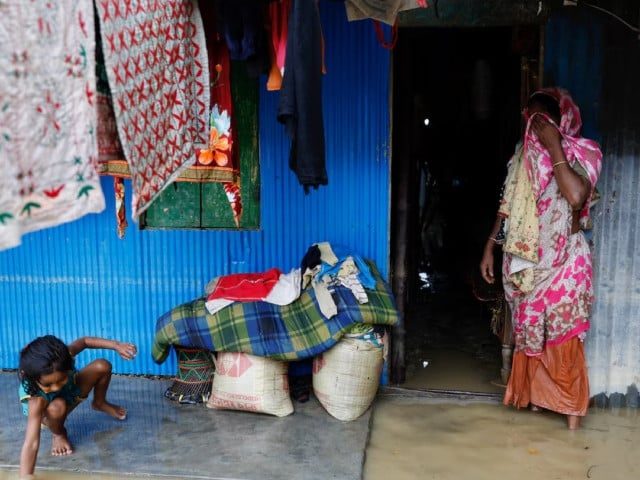Bangladesh MET Dept says flood conditions to persist if monsoon rains continue with 1.24 million families stranded

DHAKA: The death toll from the catastrophic floods in Bangladesh has climbed to 23, with approximately 1.24 million families stranded across 11 districts due to relentless monsoon rains and overflowing rivers. The devastating floods have impacted around 5.7 million people, many of whom remain isolated as floodwaters recede very slowly. The Bangladesh Meteorological Department has warned that the flood conditions could persist if the monsoon rains continue, as water levels are declining at a sluggish pace.
The floods have caused significant disruption, with blocked roads hindering rescue and relief efforts in remote areas. Currently, about 470,000 people have sought refuge in 3,500 shelters across the affected districts. Around 650 medical teams are on the ground providing treatment, with support from the army, air force, navy, and the Border Guard Bangladesh in the ongoing rescue and relief operations. The floods have submerged vast areas of land, raising concerns about potential damage to crops if the waters persist for an extended period. According to the agriculture ministry, this poses a severe threat to the nation’s agricultural output.
The World Bank Institute’s 2015 analysis estimated that 3.5 million people in Bangladesh, a country highly vulnerable to climate change, are at risk of annual river flooding. Scientists attribute the increasing frequency and severity of such events to climate change. Farah Kabir, director of ActionAid Bangladesh, emphasized the urgent need for international funds to address the impacts of climate change and frequent disasters. “Countries like Bangladesh, which contribute minimally to global emissions but face severe climate impacts, deserve immediate support to recover and build resilience,” Kabir stated.
In Noakhali, one of the hardest-hit districts, 56-year-old Shukuri Begum lost her home to the floods. Her house was swept into a pond, forcing her and her grandchildren to seek refuge with a neighbor, though they could not stay due to safety concerns. She described her harrowing situation, stating, “I have a son with physical disabilities, and we couldn’t bring him with us. We had to stack beds and leave him on top, hoping he would be safe. I don’t know what’s waiting for us,” as reported by ActionAid. The ongoing crisis highlights the urgent need for comprehensive recovery efforts and sustainable development pathways to mitigate the impacts of future climate-related disasters.
#BangladeshFloods,
#FloodCrisis,
#ClimateChange,
#DisasterRelief,
#MonsoonRains,
#Bangladesh,



